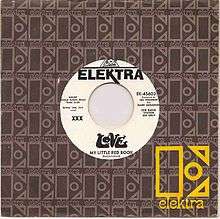My Little Red Book
| "My Little Red Book (All I Do Is Talk About You)" | ||||
|---|---|---|---|---|
| Single by Manfred Mann | ||||
| from the album My Little Red Book Of Winners | ||||
| B-side | "What Am I Doing Wrong" | |||
| Released | June 1965 | |||
| Format | 7" | |||
| Length | 2:18 | |||
| Label | Ascot | |||
| Writer(s) | ||||
| Producer(s) | John Burgess | |||
| Manfred Mann singles chronology | ||||
| ||||
"My Little Red Book" is a song composed by Burt Bacharach with lyrics by Hal David. In the wake of the British Invasion, Bacharach, a former bandleader for Marlene Dietrich, began working hands-on with beat groups of the era such as Manfred Mann.[1] Manfred Mann recorded the song for the 1965 film What's New Pussycat?, filmed between October 1964 to June 1965; the entire catalogue of music for the film was written by Bacharach and David.[2]
In 1966, the song became a rock standard when remade by the Los Angeles based group Love, where it reached No. 52 in the US national charts.[1]
Love recording
| "My Little Red Book" | ||||
|---|---|---|---|---|
 US issue | ||||
| Single by Love | ||||
| from the album Love | ||||
| B-side | "A Message to Pretty" | |||
| Released | March 1966 | |||
| Format | 7" | |||
| Recorded | Winter 1965 at RCA Studios, Hollywood | |||
| Genre | ||||
| Length | 2:38 | |||
| Label | Elektra | |||
| Writer(s) |
| |||
| Producer(s) | Jac Holzman | |||
| Love singles chronology | ||||
| ||||
Love's adaptation was the opening track for their eponymous debut album. and was released as a single with the B-side "A Message to Pretty". Love's version gained moderate mid-chart success and, with its radical interpretation of the original's pop sensibility, became a garage rock standard.[1][4] The track, unlike its predecessor, features a strong primitive sensibility and a stiff chord progression simplified by Arthur Lee and guitarist Johnny Echols and blasted out over a stomping, tambourine-fueled rhythm section. As well as its garage traits, the song has been credited for its "punk" quality; a sound Love fully achieved with its later single "7 and 7 Is".[3][4][5][6] A key feature of the track was Lee's rugged vocal performance, which has been highlighted by music critic Stewart Mason who particularly notes the way Lee sings the lines "All I did was talk, talk about you/Hear your name and I start to cry".[4]
"My Little Red Book" received a negative review from one of the song's collaborators, Burt Bacharach: Love had altered his chord changes. Nonetheless, the record was a Southern California hit and won Love a spot on American Bandstand. The disc did not chart in the UK but received airplay on the offshore pirate radio stations Radio London and Radio Caroline. (The opening lines of the melody of Love's version reminded some British listeners of the theme tune to the popular BBC TV comedy series Steptoe and Son). The guitar riff to the song showed up in considerably altered form, as played by Syd Barrett on the Pink Floyd song "Interstellar Overdrive", released on their debut album The Piper at the Gates of Dawn (1967).[7] The riff of "Interstellar Overdrive" originated when early Pink Floyd manager Peter Jenner was trying to hum a song he couldn't quite remember (which turned out to be "My Little Red Book").[7]
"My Little Red Book" and "Always See Your Face" (from Four Sail) are included on the soundtrack of High Fidelity, actor-producer John Cusack's 2000 adaptation of Nick Hornby's novel. "My Little Red Book" played over the credits. It also appeared in the Beverly Hills 90210 episode "Alone at the Top" in 1995.[8]
Other versions
- 1967 – The Beach Boys, during sessions for Wild Honey[9][10]
- 1981 – Bebe Buell, as one of two songs produced by Rick Derringer on her 4-song Rhino EP Covers Girl.
References
- 1 2 3 4 S.Dominic, Burt Bacharach, Song by Song: The Ultimate Burt Bacharach Reference for Fans, (Music Sales Group, 1 Jun 2003), pp.149-50, ISBN 0825672805
- ↑ Buchanan, Jason. "What's New Pussycat?: Film Review". Allmovie. Retrieved 16 June 2012.
- 1 2 Unterberger, Richie. "Love, Love: Album Review". Allmusic. Retrieved 16 June 2012.
- 1 2 3 Mason, Stewart (2012). "My Little Red Book". Allmusic. Retrieved 28 July 2012.
- ↑ Unterberger, Richie. "Da Capo, Love: Album Review". Allmusic. Retrieved 16 June 2012.
- ↑ Schinder, S. & Schwartz, A. (2008). Icons of Rock. ABC-CLIO. p. 263. ISBN 9780313338465.
- 1 2 Strong, Martin C. (2004). The Great Rock Discography (7th ed.). Edinburgh: Canongate Books. p. 1177. ISBN 1-84195-551-5.
- ↑ "Alone at the Top". Beverly Hills 90210. tv.com. 22 February 1995. Retrieved 12 December 2009.
- ↑ Doe, Andrew Grayham. "Unreleased Albums". Endless Summer Quarterly. Retrieved July 19, 2015.
- ↑ Planer, Lindsay. "Unsurpassed Masters, Vol. 19 (1967)". Allmusic. allmusic.com. Retrieved July 19, 2015.